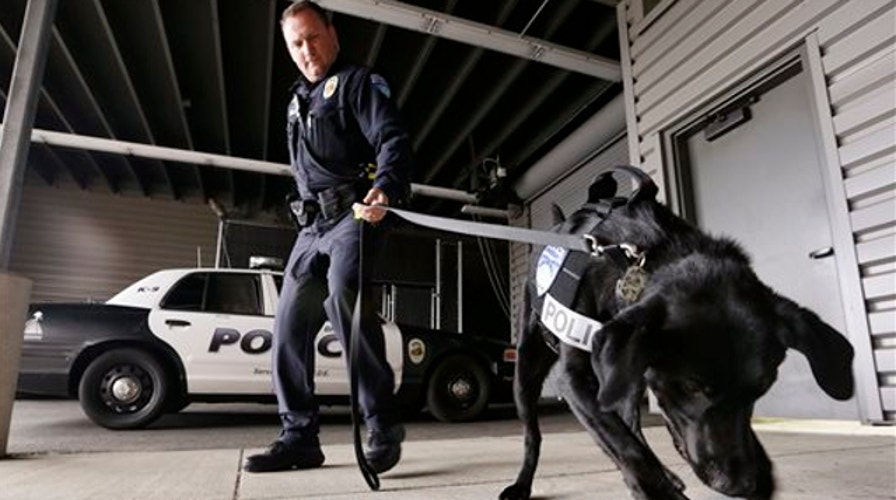Fox Nation’s ‘Hero Dogs’ highlights decorated sheriff’s K9 Dax
Officer John Forlenza and the sheriff K9 Dax join ‘Fox and Friends.’
The role of drug-sniffing K-9s is rapidly evolving in police departments across the country as an increasing number of states have legalized recreational marijuana.
"Running the dog around somebody's car to try and find a joint, those days are over," Brian Higgins, an adjunct professor at John Jay College of Criminal Justice in New York City and a public safety and security consultant, told Fox News.
New York and New Jersey legalized recreational marijuana earlier this year, joining a growing number of states, including California. Others have allowed pot for medical use or decriminalized the drug.
"We invest so much money into those dogs, to just say we're done? We couldn't do it."
Higgins served at the helm of Bergen County Police Department in New Jersey, which provided K-9 services to the county’s 70 jurisdictions.
Higgins, who retired after 27 years on the job, told Fox News that the need for dogs to detect narcotics still exists, especially for finding "large-scale transportation" and distribution.

A deputy with the Broward Sheriff's Office runs his K-9 dog, Hoover, over a stolen car for any signs of drugs on June 17, 2015 in Deerfield Beach, Florida. (Joe Raedle/Getty Images)
"Purely from a narcotics-sniffing standpoint, you’re not going to need as many [K-9s] … compared to what we currently have," he continued. That said, "cocaine is still going to be illegal, heroin is still a major problem."
Higgins added: "Really, the focus in police has not really been to arrest our way out of it. It's more for the distribution, weight and the illegal smuggling."
A New York State Police spokesperson told Fox News the department is mulling the fate of its marijuana-trained K-9s. The law enforcement agency boasts 98 police dogs, 39 of which are trained in detecting marijuana, the spokesperson said. Officers have discontinued vehicle and person searches that are conducted based solely on the scent of marijuana.
An NYPD spokesperson said the majority of the department’s police dogs and their tasks "are not impacted by the change in the law."
"However, the NYPD is currently reviewing canine search guidelines as they pertain to a limited set of circumstances," the spokesperson added in an emailed statement.
Police dogs cost hundreds of thousands of dollars over their lifespan and the reliance on them to detect illegal drugs – especially large quantities – is expected to grow, experts said.
But the need for dogs to be trained in sniffing out pot is waning, and some jurisdictions have responded to the diminished need even before weed was legalized there.
In New Jersey, law enforcement officials made the call to stop training K-9s in detecting marijuana in April 2019, over a year before it was legalized.
At the time, Attorney General Gurbir Grewal said police dogs that had already been taught to sniff out pot could still be used for detection in situations where it would still likely be illegal, such as in schools or in correctional facilities, according to an Associated Press report at the time.
He noted that police could not "un-train" their K-9s who had been taught to detect the smell of pot, while training them to do so could be done at a later date if such a need presented itself.
John DeCarlo, a policing expert and former police chief in Branford, Connecticut, estimated that there are around 50,000 K-9s currently working with departments nationwide. To start, each dog costs approximately $8,000, plus about $15,000 in training costs on top of the year-to-year expenses and the extra payments toward the personnel enlisted to care for the animals, DeCarlo said.
SOME WASH. POLICE DOGS RE-TRAINED TO AVOID SMELLING MARIJUANA
Colorado was one of the first states to lead the charge in legalizing recreational marijuana when Amendment 64 was passed in November 2012. That made the state a laboratory of sorts.
"Colorado is really a learning ground for a lot of things," Sgt. Blake White, a spokesperson for Colorado State Patrol, told Fox News. He added that the state hadn’t been tracking many marijuana-related statistics until recreational use was legalized, at which point there was "a very quick learning curve for us."
Blake described Colorado as "a test bed for legal recreational marijuana," with one result being a slow phase-out of marijuana-sniffing police dogs.
"As we introduced new dogs, we did not train them on marijuana," he said. "But financially and logistically, everything, we couldn't just stop using our canines that we had for drug detection, that were trained in marijuana, as well.
"We invest so much money into those dogs, to just say we're done? We couldn't do it."
It became more important than ever that officers establish probable cause showing that a person was using marijuana for reasons other than personal use, he said.
"The dog isn't going … to tell us, 'Oh, I smell an ounce’, or ‘I smell half an ounce, or 10 pounds.’ They're going to learn if there's an odor of one of those things that they're trained on," Blake added. "So, that's really where it relied upon the officer to say, 'OK, there's more going on here to develop my probable cause to use this dog, even though they may be trained on marijuana.’"
The Colorado State Patrol no longer has any K-9s on the force that have been trained in detecting marijuana, he said.
Legalization of pot was "a big transition for every officer," Blake said, calling it "more of a mental shift than anything else, just for law enforcement in general."

A Broomfield, Colorado, police officer demonstrates how he and his K-9 partner Nik searches the outside of a car for possible drugs in the parking lot of the civic center in this undated photo. (David Jennings/Digital First Media/Boulder Daily Camera via Getty Images)
It also created new legal questions, such as the constitutionality of using a police dog that had been trained in detecting marijuana in other drug cases.
In a 2019 decision by the Colorado Supreme Court, justices ruled that officers "must have probable cause to believe that an item or area contains a drug in violation of state law before deploying a drug-detection dog that alerts to marijuana for an exploratory sniff."
CONNECTICUT POLICE 'BIG DOGS' SNIFF OUT 420 POUNDS OF MARIJUANA IN U-HAUL TRUCK
At the time, the court was examining the circumstances surrounding a drug arrest and convictions. Police said they found what they determined to be a pipe containing traces of methamphetamine inside Kevin McKnight’s truck, but had used a police K-9 named Kilo that had been trained to detect multiple drugs, including marijuana.
The officers had not established probable cause before searching McKnight’s vehicle, and McKnight’s convictions were ultimately overturned.
"Even a hint of marijuana can trigger the same response from Kilo as any quantity of methamphetamine," the high court ruled. It later added: "[N]o matter how reliable his nose, Kilo can now render a kind of false positive for marijuana. He has been trained to alert to marijuana based on the notion that marijuana is always contraband, when that is no longer true under state law."
Another state leading the charge, albeit in a different way, is Oregon. In November of last year, possession of certain amounts of a plethora of drugs was decriminalized under a state ballot measure.

A senior deputy sheriff and K9 'Blitz', check a car for hidden drugs at Santa Susana park in this undated photo. (Photo by Spencer Weiner/Los Angeles Times via Getty Images) (Spencer Weiner/Los Angeles Times via Getty Images)
Measure 110 took effect in February, reducing penalties for certain amounts of methamphetamine, cocaine, MDMA, ecstasy, heroin, oxycodone and LSD, among other hard drugs. The measure took the focus away from policing and shifted it to addiction treatment.
"As far as I know, Oregon was the first to do this," said Capt. Tim Fox, public information officer for the Oregon State Police.
The department is no stranger to relaxed marijuana laws. Possession of small amounts was decriminalized in Oregon in 1973. Recreational use was legalized for adults in 2014.
CLICK HERE TO GET THE FOX NEWS APP
Today, under the state's new drug enforcement laws, Fox said his department is focused on "the totality" of the circumstances related to each police stop.
"Are we looking at somebody who's trying to deliver 60 pounds of cocaine from California to Washington? Or are we looking at someone who has a user amount, and they're going from neighborhood to neighborhood?" he explained. "It's everything."
If you've got a tip, you can reach Stephanie Pagones at stephanie.pagones@fox.com.




